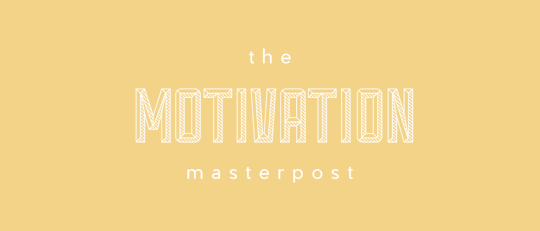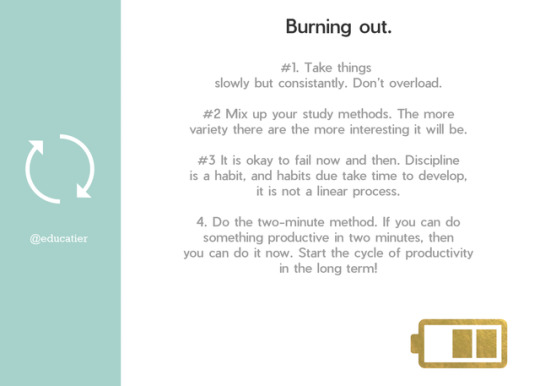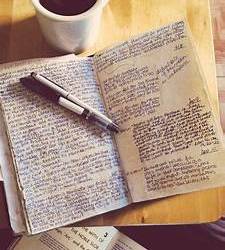Text
From Beginner to Intermediate: an intense plan for advancing in language
Introduction
I studied Spanish at school for 3 years and now I'm at a low B1 level. I can actually understand pretty well while listening or reading but I can't communicate fluently.
This plan will include vocabulary build up, some grammar revision, a lot of listening, reading and writing. And could be used for the most languages, not only Spanish.
Plan
Every day:
Conjugate one verb in present, past and future tenses
Make a list about 10 - 30 words long
Create flashcards with them and start learning them (I use Quizlet for flashcards)
Revise yesterday's set of flashcards
2-3 times a week:
Read an article or a few pages from a book
Write a few sentences about anything in your target language
Listen to one episode of podcast (at least one)
Once a week or every two weeks:
Watch a movie in your target language, preferably animated movie as the language used there is easier. You can watch with subtitles
Grammar exercises
Translate some short text
Once a month:
Write something longer, like an essay or report, on chosen topic
Additionally:
Talk to yourself, to your friends, to your pets
Text with someone
Look at the transcription while listening to the podcast for second time
Repeat what you hear (in podcast or movie)
Check words you don't know from the listening and reading
Read out loud
Listen to music in your target language - you can even learn the text and sing along
Watch YouTube in your target language
Change your phone language to the one you're learning
Think in you target language!!!
***This is very intense plan for self-learners, you don't have to do all of these things in the given time. Adjust it to your own pace. I'll try to stick to this, if I have enough time.***
10K notes
·
View notes
Text
Hey did you know I keep a google drive folder with linguistics and language books that I try to update regularly
216K notes
·
View notes
Text
Essays
Here’s a (non-exhaustive) list of essays I like/find interesting/are food for thought; I’ve tried to sort them as much as possible. The starred (*) ones are those I especially love
Literature + Writing
Godot Comes to Sarajevo - Susan Sontag
The Strangeness of Grief - V. S. Naipaul *
Memories of V. S. Naipaul - Paul Theroux *
A Rainy Day with Ruskin Bond - Mayank Austen Soofi
How Albert Camus Faced History - Adam Gopnik
Listen, Bro - Jo Livingstone
Rachel Cusk Gut-Renovates the Novel - Judith Thurman
Lost in Translation: What the First Line of “The Stranger” Should Be - Ryan Bloom
The Duke in His Domain - Truman Capote *
The Cult of Donna Tartt: Themes and Strategies in The Secret History - Ana Rita Catalão Guedes
Never Do That to a Book - Anne Fadiman *
Affecting Anger: Ideologies of Community Mobilisation in Early Hindi Novel - Rohan Chauhan *
Why I Write - George Orwell *
Rimbaud and Patti Smith: Style as Social Deviance - Carrie Jaurès Noland *
Art + Photography (+ Aesthetics)
Looking at War - Susan Sontag *
Love, sex, art, and death - Nan Goldin, David Wojnarowicz
Lyons, Szarkowski, and the Perception of Photography - Anne Wilkes Tucker
The Feminist Critique of Art History - Thalia Gouma-Peterson, Patricia Mathews
In Plato’s Cave - Susan Sontag *
On reproduction of art (Chapter 1, Ways of Seeing) - John Berger *
On nudity and women in art (Chapter 3, Ways of Seeing) - John Berger *
Kalighat Paintings - Sharmishtha Chaudhuri
Daydreams and Fragments: On How We Retrieve Images From the Past - Maël Renouard
Arthur Rimbaud: the Aesthetics of Intoxication - Enid Rhodes Peschel
Cities
Tragic Fable of Mumbai Mills - Gyan Prakash
Whose Bandra is it? - Dustin Silgardo *
Timur’s Registan: noblest public square in the world? - Srinath Perur
The first Starbucks coffee shop, Seattle - Colin Marshall *
Chhatrapati Shivaji Terminus, Mumbai’s iconic railway station - Srinath Perur
From London to Mumbai and Back Again: Gentrification and Public Policy in Comparative Perspective - Andrew Harris
The Limits of “White Town” in Colonial Calcutta - Swati Chattopadhyay
The Metropolis and Mental Life - Georg Simmel
Colonial Policy and the Culture of Immigration: Citing the Social History of Varanasi - Vinod Kumar, Shiv Narayan
A Caribbean Creole Capital: Kingston, Jamaica - Coln G. Clarke (from Colonial Cities by Robert Ross, Gerard J. Telkamp
The Colonial City and the Post-Colonial World - G. A. de Bruijne
The Nowhere City - Amos Elon *
The Vertical Flâneur: Narratorial Tradecraft in the Colonial Metropolis - Paul K. Saint-Amour
Philosophy
The trolley problem problem - James Wilson
A Brief History of Death - Nir Baram
Justice as Fairness: Political not Metaphysical - John Rawls *
Should Marxists be Interested in Exploitation? - John E. Roemer
The Discomfort You’re Feeling is Grief - Scott Berinato *
The Pandemic and the Crisis of Faith - Makarand Paranjape
If God Is Dead, Your Time is Everything - James Wood
Giving Up on God - Ronald Inglehart
The Limits of Consensual Decision - Douglas Rae *
The Science of “Muddling Through” - Charles Lindblom *
History
The Gruesome History of Eating Corpses as Medicine - Maria Dolan
The History of Loneliness - Jill Lepore *
The Anti-Che - Jay Nordlinger
From Tuskegee to Togo: the Problem of Freedom in the Empire of Cotton - Sven Beckert *
Time, Work-Discipline, and Industrial Capitalism - E. P. Thompson *
All By Myself - Martha Bailey *
The Geographical Pivot of History - H. J. Mackinder
The sea/ocean
Rim of Life - Manu Pillai
Exploring the Indian Ocean as a rich archive of history – above and below the water line - Isabel Hofmeyr, Charne Lavery
‘Piracy’, connectivity and seaborne power in the Middle Ages - Nikolas Jaspert (from The Sea in History) *
The Vikings and their age - Nils Blomkvist (from The Sea in History) *
Mercantile Networks, Port Cities, and “Pirate” States - Roxani Eleni Margariti
Phantom Peril in the Arctic - Robert David English, Morgan Grant Gardner*
Assorted ones on India
A departure from history: Kashmiri Pandits, 1990-2001 - Alexander Evans *
Writing Post-Orientalist Histories of the Third World - Gyan Prakash
Empire: How Colonial India Made Modern Britain - Aditya Mukherjee
Feminism and Nationalism in India, 1917-1947 - Aparna Basu
The Epic Riddle of Dating Ramayana, Mahabharata - Sunaina Kumar *
Caste and Politics: Identity Over System - Dipankar Gupta
Our worldview is Delhi based *
Sports (you’ll have to excuse the fact that it’s only cricket but what can i say, i’m indian)
‘Massa Day Done:’ Cricket as a Catalyst for West Indian Independence: 1950-1962 - John Newman *
Playing for power? rugby, Afrikaner nationalism and masculinity in South Africa, c.1900–70 - Albert Grundlingh
When Cricket Was a Symbol, Not Just a Sport - Baz Dreisinger
Cricket, caste, community, colonialism: the politics of a great game - Ramachandra Guha *
Cricket and Politics in Colonial India - Ramchandra Guha
MS Dhoni: A quiet radical who did it his way *
Music
Brega: Music and Conflict in Urban Brazil - Samuel M. Araújo
Color, Music and Conflict: A Study of Aggression in Trinidad with Reference to the Role of Traditional Music - J. D. Elder
The 1975 - ‘Notes On a Conditional Form’ review - Dan Stubbs *
Life Without Live - Rob Sheffield *
How Britney Spears Changed Pop - Rob Sheffield
Concert for Bangladesh
From “Help!” to “Helping out a Friend”: Imagining South Asia through the Beatles and the Concert for Bangladesh - Samantha Christiansen
Gender
Clothing Behaviour as Non-verbal Resistance - Diana Crane
The Normalisation of Queer Theory - David M. Halperin
Menstruation and the Holocaust - Jo-Ann Owusu *
Women’s Suffrage the Democratic Peace - Allan Dafoe
Pink and Blue: Coloring Inside the Lines of Gender - Catherine Zuckerman *
Women’s health concerns are dismissed more, studied less - Zoanne Clack
Food
How Food-Obsessed Millennials Shape the Future of Food - Rachel A. Becker (as a non-food obsessed somewhat-millennial, this was interesting)
Colonialism’s effect on how and what we eat - Coral Lee
Tracing Europe’s influence on India’s culinary heritage - Ruth Dsouza Prabhu
Chicken Kiev: the world’s most contested ready-meal *
From Russia with mayo: the story of a Soviet super-salad *
The Politics of Pancakes - Taylor Aucoin *
How Doughnuts Fuelled the American Dream *
Pav from the Nau
A Short History of the Vada Pav - Saira Menezes
Fantasy (mostly just harry potter and lord of the rings)
Purebloods and Mudbloods: Race, Species, and Power (from The Politics of Harry Potter)
Azkaban: Discipline, Punishment, and Human Rights (from The Politics of Harry Potter) *
Good and Evil in J. R. R. Tolkien’s Lengendarium - Jyrki Korpua
The Fairy Story: J. R. R. Tolkien and C. S. Lewis - Colin Duriez (from Tree of Tales) *
Tolkien’s Augustinian Understanding of Good and Evil: Why The Lord of the Rings Is Not Manichean - Ralph Wood (from Tree of Tales) *
Travel
The Hidden Cost of Wildlife Tourism
Chronicles of a Writer’s 1950s Road Trip Across France - Kathleen Phelan
On the Early Women Pioneers of Trail Hiking - Gwenyth Loose
On the Mythologies of the Himalaya Mountains - Ed Douglas *
More random assorted ones
The cosmos from the wheelchair (The Economist obituaries) *
In El Salvador - Joan Didion
Scientists are unravelling the mystery of pain - Yudhijit Banerjee
Notes on Nationalism - George Orwell
Politics and the English Language - George Orwell *
What Do the Humanities Do in a Crisis? - Agnes Callard *
The Politics of Joker - Kyle Smith
Sushant Singh Rajput: The outsider - Uday Bhatia *
Credibility and Mystery - John Berger
happy reading :)
34K notes
·
View notes
Text


"Nothing that is worth knowing can be taught."
-Oscar Wilde
5K notes
·
View notes
Text


A picturesque view of the Eilien Donan Castle: western Highlands of Scotland.
42K notes
·
View notes
Text
here’s a gentle reminder to accept that some bad things happened this year. maybe you were heartbroken, maybe you failed a test, tried your best to no avail, lost someone, made some bad decisions, said things you didn’t mean. some weren’t within your control, some things you can learn from, that’s ok. accepting them means you can move on and begin the new year with a new slate. don’t carry this weight with you into next year and blame yourself forever for little mistakes everyone makes. you don’t deserve this. you’re only human. focus on good things that happened, they’re easy to overlook. you did better than you think, met new people and overcame many challenges. be proud of yourself this year.
9K notes
·
View notes
Photo

PART TWO I CHROME EXTENSIONS
part one here
Wow, I really didn’t think you’d like the first part as much as you did - Over 9K notes! I’m stunned! Well, here is part 2 - chrome extensions 😊 I’ll try to update it once I work more with my laptop and as always, recommendations are appreciated!
bolded = favourite, cursive = apps I use every day
Studying
Forest well, everyone knows forest right? It’s great for concentrating and motivating each other. How about joining our forest group on discord?
Studyblue Create, study and share your own digital flashcards for free
StayFocusd restricts the amount of time you can spend on time-wasting websites. Highly configurable which is great!
max words learn about Latin and Greek roots with nice graphics
Flashtabs FlashTabs is a tool that enables you to set a deck of flashcards and process them at every new tab screen.
myHomework Student Planner planner for students. tracks classes, homework, etc. available offline and mobile
Focus A bit like Forest. A timer & distracting websites on your list will be blocked during that time.
Noisli Blocks out annoying noises - timer and study sound, very good for concentrating. Also available for iOS
Note taking and co
Evernote On my phone/computer for over 4 years now. The group feature is so great for projects. A bit like OneNote
wunderlist for lists and to-dos. you can share them too. available offline and mobile
lucidpress you can create newsletters, brochures, etc. using templates or making your own.
OneNote online gathers web pages, notes, pictures, bujos, documents all in one notebook. includes collaboration.
Canva Easily designs beautiful, professional graphics.
Languages
Mainichi Learn Japanese each time you open a new tab.
Grammarly checks your grammar while you write. Really helpful, especially for non-native speakers.
Rememberry Translate words and phrases while browsing the web and learn them through flashcards
Tab Extensions
Momentum A Tab extension that has established itself well between studyblrs. It’s simple and elegant with a to-do list feature and a focus
Tabby Cat I Such a cute extension! Every time you open a new tab there is a new calming lil’ cat waiting for you. It even purrs! Very nice an simple design.
Color tab shows a new stunning colour palette with every new tab
Infinity highly configurable tab extension Weather Tips, To-dos, History Management, Notepad Apps like Evernote, HD wallpapers and Google Search
ColorZilla allows you to pick up a colour from any site
Inspiration & Motivation
Drink! Reminds you to drink in between your study sessions
Planetarium An interactive sky map for exploring the stars and planets.
PostureMinder Pops up every once in a while to tell you not to slouch. Didn’t think it would help but I’ve actually noticed some progress.
Spotify My main source for music. You can find my study playlist here
8tracks another great site for study playlists but not free
Animal crossing music Play Animal Crossing’s smooth background music in real-time throughout your day
Others
Aerys Open too many tabs in your browser? Don’t worry, let Aerys II Targaryen, also known as the Mad King, help you burn them all!
Save to pocket save articles and websites to pocket to read later and offline
Adguard blocks pop-ups and banners and lets your battery last longer
5K notes
·
View notes
Text
Quarantine Academia:
staying up until sunrise reading classic literature
learning latin on duolingo
practicing art and anatomy
stargazing in your backgarden or through a window
discovering forgotton classical music online
running out of hobbies to try
attempting to knit or sew something
taste testing all the teas you ahve in your cupboard
rearranging your bookshelves
making elegant extravagant facial coverings/masks to wear outside that go with all ur outfits (while still keeping its purpose)
buying floral and sweet smelling hand creams and sanatizers
making lists of all the books youre going to get when libraries open again
rolling your eyes at anti-maskers
learning about random historical figures online
researching haunted places
staying safe!!
625 notes
·
View notes
Text
The 20's are upon us, so let's bring back going to university in suits, smoking in cafés while discussing academia, wearing bold red lipstick everyday and getting absolutely drunk on weekends while listening to jazz
19K notes
·
View notes
Photo

i spend way too much time on spotify and thus have way too many playlists, but here are some of them as a thank you for 11k !!
neptune / soundtrack to a warm coffee on a sleepy afternoon
pluto / 3am, lying upside down off the bed with dim phone light on your face
saturn / laughter, pillow fights and intentionally bad singing-along
mars / quiet piano floats through the window on a warm, windy evening
lunar / during windows-down summer car rides with your friends
solar / fingers tracing on a thigh and quiet evening humming
jupiter / gentle, wordless, beats to see you through revision
eclipse / a soft voice paired with a guitar, and a cup of tea
earth / for dozing off amidst gentle yawns, wrapped in blankets
cosmos / a face amongst the crowd, stairs to the subway, city lights
galaxy / clink of glassware and muted murmurs amongst background jazz
sapph / for the girls who love girls
cappuccino / the feeling of a 9am coffee on a gently sunny morning
instagram
update ;; here is part 2!
16K notes
·
View notes
Text
Habits of successful students
Discipline: “discipline is doing what needs to be done, even when you don’t want to”, which means that you have to force yourself to start doing things.
Concentration: when you make a real effort in your work (study, homeworks etc…) you will be more likely to actually focus, understand and learn.
Organization: always set tasks and goals and organize a study-schedule. Maybe you don’t really want to plan all the week, but if you just wake up and open your agenda/bullet journal/iphone calendar and write down all the things you have to do, setting due dates and deadlines, you’ll feel more conscious and encouraged to stay on track.
Tasks-splitting: sometimes, you write down your tasks. Some of these tasks may be very hard and complicated, and it will take a long long time to complete them. So, you can split them in smaller tasks, so you will feel satisfied after a shorter period of time, instead of studying for hours and still seeing that chapter undone on your study-schedule.
Watch the sunrise: when I wake up late, I feel like I don’t have enought time to do my work and lose my motivation. I literally panic and then I think “whatever, I could not complete all the things anyway”. So, if you wake up earlier you will feel more positive and controlled.
Smart reading: try not to read your textbook just like a newspaper. For every paragraph you read, try to underline and write down key words and then your question about that subject. Literally, turn your textbook into questions. If you write down question - particularly why…? - and think about the answer, you will be more likely to remember that stuff later.
Healthy lifestile: if you don’t drink enough water in the morning, you will be more likely to have a decrease of concentration in the afternoon/evening, so: stay hydrated. Try also to have some snaks every one-two hours: feed your brain.
31K notes
·
View notes
Photo




Masterpost 4 out of 50: The Motivation Self-Discipline Masterpost
It’s better to work blindly than not work at all.
22K notes
·
View notes
Text
40 Study Tips & Tricks
I thought to write down the “script” to one of my most viewed videos, with 40 study tips & tricks. It’s easier to read them and pass on the word!
Organization Tips:
1. Incorporate homework and classes in you daily planner – that will give you an overall glimpse of how your week will be about and how much time you need to spend in your studying sessions!
2. Color coordinate classes – be it notes, your planner, your textbooks or binders, pick a unique color for each class and work around the hues of that color to get more organized!
3. Make your own syllabus – if your professor doesn’t provide a syllabus for your class, try to make one before the school year working around your given textbooks or other given material.
4. Make study guides – make a study guide from your syllabus and draw before each topic two boxes: one for a midtest and one for the final test. When you have one of these tests, check the boxes when you’ve finished studying the chapter so you won’t miss anything!
5. Reference your material throughout – most of the times, we students work with in-class notes, textbooks and a syllabus. Since we get small bits of information here and there it’s important to reference every page throughout all your material so you can quickly access your information without having to flip endlessly through pages!
6. Keep a dashboard nearby – Whenever you use a notebook or a binder, make a dashboard on the first page with post it notes so you can quickly scribble any questions, homework or page numbers. When you get home, you just need to open your dashboard and attend those notes.
7. Print any tests, exercises and exams you can find – keep those in the end of your binder. These are perfect to practice before exams and tests because they really reflect what you will be tested about. Set an alarm clock for the deadline and start working on those!
8. Condense – organization disappears when you have too many of everything. Working with more than one planner in your life will make everything chaotic. If you think you need a second planner because you don’t have enough space to write in the first one, it’s because you don’t have available time as well. Don’t fool yourself and set achievable goals!
9. Customize your textbooks – most of the times, textbooks are formal books where information is hard to come by. Make your own tabs and write every chapter on them so they stick out – flag any charts, tables or graphics. Everything needs to be incredibly accessible!
10 Print a special planning sheet before finals: Organizing your studying by chapters and/or topics before finals is tremendously important since it lets you organize the amount of time you dedicate to each subject,
Study Sessions and Time Management
11. Save at least one afternoon or one morning a week for intensive studying. These is your “life-saver” – when you get so full of homework and projects that you can’t incorporate them into your daily academic routine, one free afternoon to organize your school life will really come in handy! Make an appointment with yourself!
12. Prepare in advance – although most professors may not ask you to prepare a class in advance, if you have the means to, go ahead. Grab a sheet and make a summary of the chapter your class will be about. Write the major topics and key information and take that guide to class. When your professor repeats previously studied information, you will be able to understand everything much better!
13. Never leave something behind – Even if you have a more light class, where professors don’t request homework or any side projects, don’t let that fool you! Be disciplined and be your own professors! Make your own projects and learn everything you can so you can nail those finals when they arrive.
14. Write your questions – most of the time, in a heavy study session, we come up with tons of questions and sometimes we just leave them behind. Write them down in your dashboard or a small notebook and ask your professors (personally or via e-mail). You can also ask your schoolmates in a facebook group created for that purpose!
15. Set an alarm clock and reward yourself – even if you study during an entire afternoon your studying will be pointless if you don’t take regular breaks. Set an alarm clock for one hour/one hour and a half and then take a 15 minute break. Never study for more than 2 hours straight! Even if you don’t notice, you’ll get less and less focused.
16. . Make a list – before each study session I like to grab my notepad and write down everything that I need to do before my session ends: the chapters I need to read, the pages I need to go through and the homework I need to complete. Sometimes I even write theses lists when I’m in college so I’ll have more determination to complete those tasks once I get home.
17 Work on the least interesting thing first. There are always classes or projects that we like the least – and those are the ones that we need to tackle first. You will start your studying session concentrated, which will let you go through the worst tasks faster.
18 Print, print, print. try to print everything you can and never study from your computer. Having your PDF files printed at hand will let you concentrate better, highlight and write some notes in the margins. You can take these everywhere with you and even turn them into small guides for future classes!
19. If you finish ahead, don’t quit. Perhaps the time you’ve saved for your study session has come to an end way before you have planned. That doesn’t mean you should stop right now – Take that time to review what you’ve learned so far or prepare other classes ahead of time!
20. Study in an organized space – make your own studying corner – bring everything you will need, from textbooks, binders and notebooks, to a cup of coffee and your computer. Keep them neatily organized on your desk so everything is at hand and on sight. Put on some soft background music (links down below) and adjust the lightning.
In class notes
21. If your professor provides PowerPoint slides before each class, print them (six or four per page) and bring them to class. Write in the margins and more throughout information in the back so it’s all condensed and tight. This is where you’ll take your notes. If you prefer to write on lined paper, think about copying some ruled paper to the back of your printed slides.
22. If your professor asks you to prepare your class in advance, try to make a small guide for each class. Open the comments column in MSWord and print the pages with that column. When you go to class, incorporate the in-class notes in that column, next to the relevant information so everything is nice and condensed.
23 If you are in a information-heavy class, try to adopt the Cornell method, which is the best, in my opinion, when you need to be a fast writer. There’s a video right here on how to use this method.
24. If you are in a bits-and-pieces class, which is that kind of class where the professor just gives a few key points and then gives practical examples or makes you work in group, try to adopt the box method – you can draw these boxes yourself or make them with post it notes – these are way more visual and perfect to memorize information.
25. Write in-class flashcards – if you don’t have flashcards around, make tiny flashcards on the top of your notes, where you cover the definitions you’ve written with the name of the definition. Each time you open your notes, try to remember the hidden definition. Automatic studying, every time!
26. Participate in class – nothing better than to be actively involved in your class discussion. For most of us, shy creatures, participating can be dreadful – but once you get out of your box, you’ll see how participating really makes you understand the subject!
27. If you have any questions during class, raise your hand and ask them. If your professor doesn’t like being interrupted, write them down and approach them in the end of the class. Sometimes, the little things we don’t understand are exactly the ones that come up on the final exam!
28. Ask for examples. Examples are probably the thing that makes your brain connect the information faster. If your professor isn’t keen on providing examples, suggest your own and see if your answer comes up right. Sometimes, examples are the thing that really makes us understand our material and our definitions, since they transform formal information into relatable events.
29. Sit at the front. It sounds too straightforward but sitting at the front really makes wonders. You won’t get distracted by what you classmates are doing, you will focus on the professor, who is right in front of you and you will resist the temptation of going to Facebook and Instagram during a boring presentation.
30. Write a brief summary at the end of the class. During those five minutes where everyone is dismissed and leaving the room, write a brief summary of that classes’ key points in the back of a page – this is fundamental in the Cornell method but can be used in any other method as well.
Finals Guide
31 Skim through your material two times: at first, you should start by studying your material starting from the end. The last lessons will be fresh in your memory and it’s very important to reinforce your knowledge on these while you can. In the second reading, you should start from the beginning, as usual. It’s important to make these two readings so you can go through the information in a much more flexible way.
32. Make a mindmap of each chapter. A mindmap is a chart that relates key words and important information, making it easy to understand the relationship and hierarchy between such key words. Use colors and images to memorize your material better. Oh, and don’t forget to check out my video on how to make mindmaps!
33. Read each of the titles and try to say out loud its contents, explaining each concept and the relationship between them. Imagine you are the teacher and are lecturing that subject to a crowd. If you skip any of the subjects, do it all over again. The more you repeat, the better you will memorize.
34. It’s time for some flash cards! Write the topic or the title on one side and the meaning or the explanation on the other. Try to cover as many topics or titles as you can and go through your cards while memorizing as best as you can each of the concepts. Try to do it backwards if you have time to do so!
35. On the day before the exam, skim through your mindmaps and flash cards again and always try to study while talking. Saying your content out loud will force your brain to relate information in a much more cohesive way and you’ll memorize everything much better.
36. Read the entire exam from top to bottom. Underline or circle any important words that you think will be crucial in you answer. After that, calculate how much time you should spend answering each question: this simple calculation will take only twenty seconds and will help you organize your time. Try to save five minutes at the end for revisions.
37. If you are solving a written exam and not multiple choice, try as much as possible to organize each answer in a structured way, saving two lines just to present your line of thought and writing each different argument in a different paragraph. Draft a conclusion at the end to underline the centre of your answer. Sometimes softly underlining some keywords is important to make your professor notice that you’ve correctly given importance to certain concepts.
38. Use these symbols for each question: one dot if you aren’t sure of the answer, two dots if you are sure of your answer and a circle if you are completely unaware of your answer. Start by answering any question with two dots; after those are all answered, go on through the two dots question. Leave the circle questions to the end – and ALWAYS answer them! Even if you don’t know what they’re about, who knows if you will be able to come up with something right?
39. Review your test one final time – many times, we make a lot of mistakes under stress and now is when you should spot them and amend them. This can be the difference between a B and an A!
40. Don’t take this too seriously – school is an important aspect of our lives but it isn’t everything. Failure comes many times and these failures can even drive you away from something that was simply not meant to be. Don’t stress out because everyone goes through the same!
25K notes
·
View notes
Text
Routledge Masterpost
Here are all of the Routledge Grammar PDFs that I currently have. I’ll be updating whenever I find more. Let me know if there’s one in particular you want me to look for^^
Last Update: 2017/04/24
Fixed Intermediate Japanese: A Grammar and Workbook link
Added books for Czech, English, French, French Creoles, Persian, Ukranian
Added more books in Cantonese, Danish, Greek, Polish, Spanish, Swedish
Arabic
Arabic: An Essential Grammar
Basic Arabic: A Grammar and Workbook
Modern Written Arabic: A Comprehensive Grammar
Cantonese
Basic Cantonese: A Grammar and Workbook
Cantonese: A Comprehensive Grammar
Intermediate Cantonese: A Grammar and Workbook
Czech
Czech: An Essential Grammar
Danish
Danish: A Comprehensive Grammar
Danish: An Essential Grammar
Dutch
Basic Dutch: A Grammar and Workbook
Dutch: A Comprehensive Grammar
Dutch: An Essential Grammar
Intermediate Dutch: A Grammar and Workbook
English
English: An Essential Grammar
Finnish
Finnish: An Essential Grammar
French
Modern French Grammar Workbook
French Creoles
French Creoles: A Comprehensive and Comparative Grammar
German
Basic German: A Grammar and Workbook
German: An Essential Grammar
Intermediate German: A Grammar and Workbook
Greek
Greek: A Comprehensive Grammar
Greek: An Essential Grammar of the Modern Language
Hindi
Hindi: An Essential Grammar
Hebrew
Modern Hebrew: An Essential Grammar
Hungarian
Hungarian: An Essential Grammar
Indonesian
Indonesian: A Comprehensive Grammar
Irish
Basic Irish: A Grammar and Workbook
Intermediate Irish: A Grammar and Workbook
Italian
Basic Italian: A Grammar and Workbook
Japanese
Basic Japanese: A Grammar and Workbook
Intermediate Japanese: A Grammar and Workbook
Japanese: A Comprehensive Grammar
Korean
Basic Korean: A Grammar and Workbook
Intermediate Korean: A Grammar and Workbook
Korean: A Comprehensive Grammar
Latin
Intensive Basic Latin: A Grammar and Workbook
Intensive Intermediate Latin: A Grammar and Workbook
Latvian
Latvian: An Essential Grammar
Mandarin Chinese
Basic Chinese: A Grammar and Workbook
Intermediate Chinese: A Grammar and Workbook
Chinese: A Comprehensive Grammar
Chinese: An Essential Grammar
Norwegian
Norwegian: An Essential Grammar
Persian
Basic Persian: A Grammar and Workbook
Intermediate Persian: A Grammar and Workbook
Polish
Basic Polish: A Grammar and Workbook
Intermediate Polish: A Grammar and Workbook
Polish: A Comprehensive Grammar
Polish: An Essential Grammar
Portuguese
Portuguese: An Essential Grammar
Romanian
Romanian: An Essential Grammar
Russian
Basic Russian: A Grammar and Workbook
Intermediate Russian: A Grammar and Workbook
Serbian
Serbian: An Essential Grammar
Spanish
Basic Spanish: A Grammar and Workbook
Intermediate Spanish: A Grammar and Workbook
Spanish: An Essential Grammar
Swahili
Swahili Grammar and Workbook
Swedish
Swedish: A Comprehensive Grammar
Swedish: An Essential Grammar
Thai
Thai: An Essential Grammar
Turkish
Turkish: A Comprehensive Grammar
Ukrainian
Ukrainian: A Comprehensive Grammar
Urdu
Urdu: An Essential Grammar
Welsh
Modern Welsh: A Comprehensive Grammar
Yiddish
Basic Yiddish: A Grammar and Textbook
Hope this helps everyone out a bit! Happy studying^^
-koreanbreeze
22K notes
·
View notes
Text
Unanswered Questions

I’m trying so hard and keeping up with the reality of the world, continually wondering, consistently questioning whether this is a reality, whether it’s my reality. My hands ache from carrying the responsibilities that I must carry out. The ones that I must. It sounds horrible, and some days it is, but some days I find comfort in the ingrained activities, the ones I don’t have to think about…
View On WordPress
4 notes
·
View notes
Text
Just a Spark
There she was. Alone, in silence. Only the wind wailed behind her, singing her a song to which her skirt danced. Her coffee-roasted hair tumbled over her shoulders, long strands lightly hitting her face. The cold air stung her eyes but not as much as the thoughts in her mind.

image source: http://www.nuevamujer.com
Her eyes opened to see the world around her. Alone, surrounded by just trees and…
View On WordPress
1 note
·
View note
Text
A Strange Dream

I can’t even remember my first encounter with music, but the safety I feel in saying that it has always been there tells me that music and I go way back. But writing, writing, I remember. I don’t think I ever hated it, but Lord was I bad when I started. I have a long way to go, but when I read my pieces now, I have a sense of contentment and a small speckle of pride too.
The past few months have…
View On WordPress
0 notes